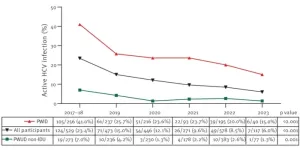(Press-News.org) In a rigorous medical records study covering tens of thousands of patients, Johns Hopkins Medicine researchers conclude that some patients with preoperative anemia have better outcomes if they get iron infusions before surgery rather than standard red blood cell transfusions.
The findings, published July 22 in Anesthesia & Analgesia, contribute to mounting evidence that such iron infusions, which boost the production of a person’s own red blood cells, are better than relying on someone else’s blood.
“Anemia is incredibly common, especially in surgical patients, and until recently the default treatment has been blood transfusions prior to the procedure,” says Steven Frank, M.D., professor of anesthesiology and critical care medicine at the Johns Hopkins University School of Medicine. “However, our retrospective study showed a benefit of iron infusions over preoperative blood transfusions in decreasing morbidity and mortality, increasing hemoglobin and decreasing the need for blood transfusions.”
Iron is a mineral that the human body needs to make hemoglobin, a protein in red blood cells that carries oxygen to organs throughout the body. If there is insufficient iron in a patient’s blood, the person becomes anemic, meaning there are not enough healthy red blood cells to deliver enough oxygen. This is particularly concerning for patients undergoing surgery because there is almost always some amount of blood loss during any procedure.
While blood transfusions work, they also carry risks, including blood clots, hospital-acquired infections, allergic reactions and pulmonary complications. It can be difficult to find a donor match if a patient has certain antibodies or a condition such as sickle cell disease. As a result, physicians have long sought strategies to minimize the use of transfusions.
In the new study, the Johns Hopkins Medicine research team used data from the TriNetX Research Network database, a global network of health care organizations that pool de-identified patient information. The team’s analysis used such information gathered between 2003 and 2023 on 154,358 patients over 18 years old with a diagnosis of iron-deficient anemia prior to surgery.
The data were sorted into groups of patients who were treated with iron preoperatively but not with a blood transfusion, and patients who received a preoperative blood transfusion but no iron infusion. These infusions happened several weeks before a scheduled surgical procedure. Researchers then compared postoperative complication rates including respiratory problems, kidney issues, blood clots, infections and death rates.
From this review, researchers found a 37% reduction in mortality and a 24% reduction in morbidity (complications) in patients who were treated with iron infusions compared with those treated with blood transfusions. This finding means that patients receiving iron infusions may recover more quickly and fully from their surgical procedures without any added complications that may arise from a blood transfusion.
“The Joint Commission and the American Medical Association named blood transfusion as the No. 1 overused procedure in 2012. For perspective, also on the list was antibiotic use to treat the common cold,” says Frank. “Research shows reducing blood transfusions can improve patient outcomes, and providing patients with preoperative iron infusions is an easy way to do so.”
The researchers say they hope the new study will encourage more widespread use of preoperative iron infusions in surgical patients. They also hope to examine if oral iron supplements garner the same outcomes as infusions.
Treating preoperative anemia is one of several methods used in a comprehensive patient blood management program. Such a program, like the one at Johns Hopkins, can save blood and money while resulting in the same or better patient outcomes. In another recent publication, the researchers reported a substantial return on investment for their blood management program. They found that for every dollar spent to support the program, 7.5 dollars were saved or generated in return.
Simple things, like keeping patients warm and maintaining a lower blood pressure during surgery, or giving medications such as tranexamic acid, can reduce bleeding. “In addition to treating preoperative anemia,” Frank says, “keeping the blood in the patient during surgery is one of the primary goals in any patient blood management program.” Such programs, by reducing unnecessary transfusions, promote high-value practice by improving outcomes and reducing costs.
Other scientists who contributed to this research are Una Choi, Ryan Nicholson, Ananda Thomas, Elizabeth Crowe, John Ulatowski, Linda Resar and Nadia Hensley of the Johns Hopkins University School of Medicine.Hensley has been on the scientific advisory board of Octapharma and receives author royalties from Wolters Kluwer for contributions to uptodate.com. Frank is on the scientific advisory board for Haemonetics. All other authors have no conflicts of interest to disclose.
END
Study suggests preoperative iron infusions work better than blood transfusions for some anemic patients
Researchers report iron infusions were associated with a 37% reduction in mortality and a 24% reduction in medical complications among study participants
2024-07-25
ELSE PRESS RELEASES FROM THIS DATE:
UH engineer develops technique that enhances thermal imaging and infrared thermography for police, medical, military use
2024-07-25
A new method to measure the continuous spectrum of light, developed in the lab of University of Houston professor of electrical and computer engineering Jiming Bao, is set to improve thermal imaging and infrared thermography, techniques used to measure and visualize temperature distributions without direct contact with the subject being photographed.
Because they are highly sensitive, thermal cameras and infrared thermometers measure temperature accurately from a distance, making them versatile and valuable tools in many fields from the military to medical diagnostics. They detect infrared radiation, ...
Cancer drug could ease cognitive function for some with autism
2024-07-25
An experimental cancer drug could make thinking easier for individuals with Rett syndrome, a rare disorder linked to autism, according to new research from the University of California San Diego — a discovery that could lead to therapies for patients with other neurological conditions.
The findings, published July 25 in Stem Cell Reports, highlight the role of microglia — a type of white blood cell found in the central nervous system — in the formation of the human brain.
While such cells have been better studied in neurodegenerative disorders like Alzheimer’s disease, amyotrophic ...
Oregon State University research uncovers better way to produce green hydrogen
2024-07-25
CORVALLIS, Ore. – Researchers at Oregon State University have developed a material that shows a remarkable ability to convert sunlight and water into clean energy.
A collaboration led by Kyriakos Stylianou of the OSU College of Science created a photocatalyst that enables the high-speed, high-efficiency production of hydrogen, used in fuel cells for cars as well as in the manufacture of many chemicals including ammonia, in the refining of metals and in making plastics.
The findings represent a potential new tool to use against greenhouse gas emissions and climate change, said Stylianou, whose research focuses ...
Transforming environmental testing one shake at a time
2024-07-25
ALBUQUERQUE, N.M. — Testing weapons and components in a lab-controlled environment has always been at the center of Sandia National Laboratories’ mission. Since the U.S. stopped underground explosives tests on weapons in the early 1990s, Sandia has developed other methods to conduct experiments that mimic the range of environments a weapons unit might experience. A newly developed method is getting better results, with fewer tests, in less time.
“Our job in the laboratory is to simulate the environment and lifetime of stress ...
Midwestern launches public research profiles through Symplectic Elements
2024-07-25
Digital Science, a technology company serving stakeholders across the research ecosystem, is pleased to share the news that Midwestern University has successfully launched a new faculty profiles portal powered by Symplectic Elements.
Midwestern has been utilizing Symplectic Elements as its Research Information Management System since 2019, and has made the decision to expand its use by adding public profiles. The faculty profiles repurpose the comprehensive data already within Elements to populate enhanced profiles, including biographical information as ...
Accelerating motor neurone disease research by harnessing the power of health data
2024-07-25
MND is a devastating disease affecting the motor neurones in the brain and spinal cord, leading to progressive muscle weakness and paralysis. Despite decades of research, several scientific challenges continue to impede the development of effective therapies for the thousands of people living with MND in the UK.
The MND Research Data Catalyst is a new initiative led by HDR UK and DPUK, with the UK Dementia Research Institute (UK DRI) and in partnership with the MND research community, to accelerate the discovery of new diagnostics, treatments and support better care for MND patients. This will be achieved by harnessing the UK’s trustworthy, large-scale health ...
World Hepatitis Day 2024: Madrid study shows decrease in active hepatitis C infection among risk groups, indicating effectiveness of public health measures
2024-07-25
A study conducted through a mobile screening unit in Madrid, Spain from 2017 to 2023 and published in Eurosurveillance found that active hepatitis C virus (HCV) infection decreased from 23% to 6% in that period among people who use drugs (PWUD) that visited the unit. The study found that the use of intravenous drugs was the most significant risk factor for infection among PWUD. It confirmed that HCV screening and treatment programmes targeting this at-risk population are effective and can help achieve the World Health Organization goal of HCV elimination as public health threat by 2030.
Study participants and methods
Participants were recruited in ‘hotspots’ ...
After Trump’s election, women of color had more underweight, premature babies, study finds
2024-07-25
In 2016, President-elect Donald Trump vowed to deport thousands of immigrants. His anti-immigration message vilified foreign-born people living in the U.S. as criminals and rapists. Besides making good on many harsh, immigration-related promises, the years after his election stoked the anxieties of millions of people.
Now, with Trump once again in contention for the White House, a new study from the University of California, Berkeley, reveals the surprising — and potentially lifelong — association between those early Trump years and the health of society's newest citizens.
In ...
Space-trekking muscle tests drugs for microgravity-induced muscle impairment
2024-07-25
A gentle rumble ran under Ngan Huang’s feet as a rocket carrying her research—live, human muscle cells grown on scaffolds fixed on tiny chips—lifted off, climbed, and disappeared into the sky to the International Space Station National Laboratory. These chips would help Huang better understand muscle impairment, often seen in astronauts and older adults, and test drugs to counter the condition.
Now, the results are back. Reporting in a study published July 25 in Stem Cell Reports, Huang’s team showed that space-travelling muscle had metabolic changes that indicate ...
In clinical trial, fecal matter transplant helped half of patients with gastrointestinal cancers overcome resistance to immunotherapy treatment
2024-07-25
Findings from a small, proof-of-concept clinical trial have suggested that fecal microbiota transplants (FMTs) can boost the effectiveness of immunotherapy in a range of gastrointestinal cancers. In the study, published July 25 in the journal Cell Host & Microbe, six of 13 patients who had previously shown resistance to immune checkpoint inhibitors benefited from receiving FMTs from donors who had previously responded to treatment. The investigators also identified specific strains of bacteria associated with better or worse responses to FMT and immune checkpoint drugs.
“This research highlights the complex interplay between beneficial ...
LAST 30 PRESS RELEASES:
Visible light-driven deracemization of α-aryl ketones synergistically catalyzed by thiophenols and chiral phosphoric acid
Most AI bots lack basic safety disclosures, study finds
How competitive gaming on discord fosters social connections
CU Anschutz School of Medicine receives best ranking in NIH funding in 20 years
Mayo Clinic opens patient information office in Cayman Islands
Phonon lasers unlock ultrabroadband acoustic frequency combs
Babies with an increased likelihood of autism may struggle to settle into deep, restorative sleep, according to a new study from the University of East Anglia.
National Reactor Innovation Center opens Molten Salt Thermophysical Examination Capability at INL
International Progressive MS Alliance awards €6.9 million to three studies researching therapies to address common symptoms of progressive MS
Can your soil’s color predict its health?
Biochar nanomaterials could transform medicine, energy, and climate solutions
Turning waste into power: scientists convert discarded phone batteries and industrial lignin into high-performance sodium battery materials
PhD student maps mysterious upper atmosphere of Uranus for the first time
Idaho National Laboratory to accelerate nuclear energy deployment with NVIDIA AI through the Genesis Mission
Blood test could help guide treatment decisions in germ cell tumors
New ‘scimitar-crested’ Spinosaurus species discovered in the central Sahara
“Cyborg” pancreatic organoids can monitor the maturation of islet cells
Technique to extract concepts from AI models can help steer and monitor model outputs
Study clarifies the cancer genome in domestic cats
Crested Spinosaurus fossil was aquatic, but lived 1,000 kilometers from the Tethys Sea
MULTI-evolve: Rapid evolution of complex multi-mutant proteins
A new method to steer AI output uncovers vulnerabilities and potential improvements
Why some objects in space look like snowmen
Flickering glacial climate may have shaped early human evolution
First AHA/ACC acute pulmonary embolism guideline: prompt diagnosis and treatment are key
Could “cyborg” transplants replace pancreatic tissue damaged by diabetes?
Hearing a molecule’s solo performance
Justice after trauma? Race, red tape keep sexual assault victims from compensation
Columbia researchers awarded ARPA-H funding to speed diagnosis of lymphatic disorders
James R. Downing, MD, to step down as president and CEO of St. Jude Children’s Research Hospital in late 2026
[Press-News.org] Study suggests preoperative iron infusions work better than blood transfusions for some anemic patientsResearchers report iron infusions were associated with a 37% reduction in mortality and a 24% reduction in medical complications among study participants






